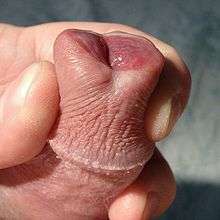Meatotomy

A meatotomy (/miːəˈtɒtəmɪ/[1][2]) is a form of penile modification in which the underside of the glans is split. The procedure may be performed by a doctor to alleviate meatal stenosis or urethral stricture.[3][4][5][6]
Procedure
A variety of techniques may be used to make the cut, but a doctor will generally crush the ventral meatus, urethra, and upper frenulum for 60 seconds with a straight Kelly hemostat and then divide the crush line with fine-tipped scissors. Other techniques include cauterisation, cutting with a scalpel (sometimes aided by clamps), or by using existing fistulas from it to tie off the area to be cut. Depending on the anatomy of the individual and the extent of the split, meatotomy performed with a scalpel may involve heavy bleeding, while crush and cauterisation methods are relatively bloodless. Regardless of the procedure used, meatotomies, like other genital modifications and genital piercings, heal quickly. Unlike other genital modifications, the glans tissue does not have a tendency to re-adhere to itself or heal closed.
A meatotomy may be extended to subincision or genital bisection, which are both much more complex and serious modifications.
Effects
Aside from the exposure of previously internal tissues, the newly enlarged urethral opening may hinder the ability to control the direction and shape of one's urine stream. This may result in messy urination and require that the meatotomized individual sit while urinating; however, this is not universally true. The larger urethral opening may also reduce the velocity of ejaculate, thereby reducing distance of ejaculation.
Repair of a meatotomy can be painful and difficult, and is similar to hypospadias repair.
See also
Notes
- Specific
- ↑ OED 2nd edition, 1989.
- ↑ Entry "meatotomy" in Merriam-Webster Online Dictionary.
- ↑ Choudhury 2008
- ↑ Palmer 2010
- ↑ Angel, C.A. (June 12, 2006). "Meatal stenosis". eMedicine. Retrieved 2011-10-23.
- ↑ Yachia 2007
- Bibliography
- Choudhury, Dhiraj (2008), General Surgical Operations, Jaypee Brothers Medical Publishers, p. 336, ISBN 81-8448-195-0
- Palmer, Jeffrey S. (2010), Pediatric Urology: A General Urologist's Guide, Springer, p. 132, ISBN 1-60327-419-7
- Yachia, Daniel (2007), Text Atlas of Penile Surgery, CRC Press, pp. 151–152, ISBN 1-84184-517-5